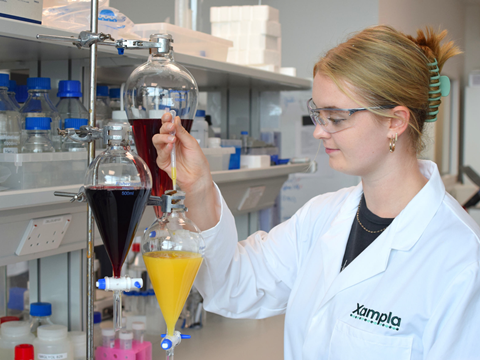
In partnership with Yili Innovation Centre Europe, Xampla will test and validate its microscopic natural polymer capsules for preserving vitamins and nutrients in milk, cheese, yoghurt, and other dairy products.
Xampla is a scale-up from the University of Cambridge. Its ‘world-first’ plant material is designed to resist degradation risks posed to products by UV, pH, or heat shock – thus protecting beverage ingredients, without changing the product’s texture or taste, at every stage between production and digestion.
By partnering with Yili to pilot its nutrient microcapsule technology, Xampla intends to scale it up from proof of concept to full-scale production. It plans to ‘accelerate the deployment’ of nutrient microcapsules into advanced fortification technology and other global markets.
Yili is reported to be Asia’s largest, fastest-growing dairy company, and offers such products as liquid milk, infant and adult milk powder, yoghurt, ice cream, and cheese. Its Innovation Centre in Europe invests in startups across the diary supply chain, supported by partnerships with the University of Cambridge Institute for Manufacturing (IfM), Centre for Business Innovation (CfBI), StartLife, International Life Sciences Institute (ILSI) Europe, and more.
“Having the support of this leading global dairy brand has further strengthened our position as leaders in food and beverage fortification technology,” said Xampla CEO Alexandra French. “We look forward to seeing our groundbreaking, world-first microencapsulation technology make its way from the laboratory to a market of health and environment-conscious consumers.”
Gerrit Smit, managing director of Yili Innovation Center Europe, added: “We are excited to start this pilot collaboration with Xampla. Yili always strives to bring next-generation products with enhanced nutrition and health to consumers.”
Back in 2022, Microban International sought to prevent mould and mildew, avoid stains and odours, and keep products in good condition with the release of LapisShield, a heavy-metal-free technology designed to bring antimicrobial features into water-based coating formulations.
More recently, Unconventional Ventures, LRF Ventures, Almi Invest GreenTech, and industry angels granted Saveggy €1.76 million in investments for its edible, plant-based coating. This, too, intends to extend the shelf life of fresh fruits and vegetables to match that of a product wrapped in plastic, and comes after Saveggy’s partnership with Swedish-grown cucumber and tomato producer odlarna.se to develop production and packaging lines and an application technology for the coating.
In another development from Xampla, it will apply its plant-based Morro Coating polymer to a range of takeaway boxes in a multi-year supply deal with Huhtamaki and 2M Group of Companies. Made from plant protein, the coating aims to replace both fossil-based and renewable plastic coatings.
If you liked this story, you might also enjoy:
How are the top brands progressing on packaging sustainability?
Sustainable Innovation Report 2024: Current trends and future priorities
Reuse vs. single use – which is better for the environment?
The ultimate guide to global plastic sustainability regulation


















No comments yet